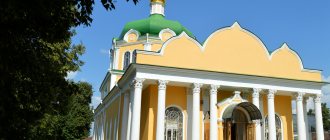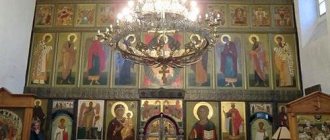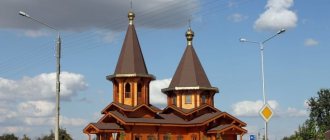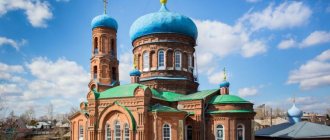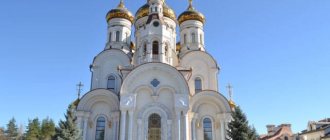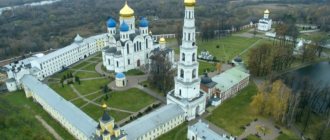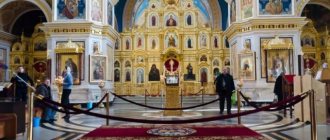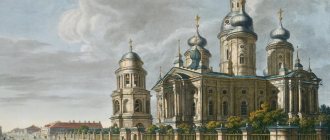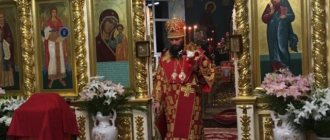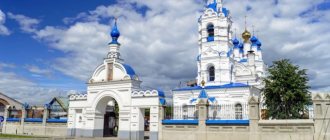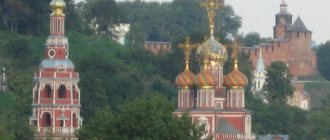Amazing things are happening in the Moscow diocese
About Metropolitan Juvenalia
Amazing things are happening in the Moscow diocese, headed by Metropolitan Juvenaly (Poyarkov) of Krutitsky and Kolomna, who turns 84 this year. Metropolitan Yuvenaly is even more fierce than at the beginning of his ministry at the Krutitsa See and even more than during the time of Alexy II. Bans priests for any reason; a report from the dean, who did not share something with his rector or cleric, is enough - and the sentence is passed immediately.
Today in the Moscow diocese there are 165 priests banned from serving, with a total number of clergy of 1554, that is, more than every tenth priest! There are also a lot of supernumerary ones - 113 clergy, of which only 17 have reached the age of 75, while in the Moscow city diocese, with 1685 clergy, the number of banned priests is such an insignificant percentage that it’s not worth talking about.
What is the matter, maybe in the Moscow (regional) diocese there is such a clergy that only constant repression can keep in obedience the priests entrusted to Metropolitan Juvenal, who leads his diocese from the Domodedovo hospital, who constantly violate their oath and apostolic rules? However, in the constant transfers, bans, petitions for the staff, the main tendency of Metropolitan Juvenaly can be traced, presumably directly propagated by him to his dean - this is the replacement of venerable, respected pastors - rectors of churches with young graduates of the Kolomna Seminary and those transferred from other dioceses.
Why did those priests who organize parish life and lead a permanent Orthodox mission not please Metropolitan Juvenaly? The fact that they are champions of Orthodoxy, preventing modernist tendencies, directly related to the Catholic and ecumenical position of Metropolitan Juvenal himself, from entering the Church. The young chicks of the nest of Bishop Konstantin of Zaraisk or PSTGU V. Vorobyov, thoroughly imbued with the teachings of Origen and the need to introduce modernism into the Russian Orthodox Church, are ready not only to fulfill any whim of the dean and ruling bishop, but often go further, directly deviating into the Catholic heresy.
What remains for the banned and unemployed priests, many of whom have large families? To deviate into one’s own personal schism – to go to other churches, including the OCU, to join the ranks of the Old Believers, or even to transform into a sect. Thus, by thoughtlessly replacing experienced pastors, who have worked hard in the field of the Orthodox faith, with beardless youths, colossal damage is caused to the Church, when the spiritual children of a banned/supernumerary/demoted priest, transferred to a remote place, disperse in all directions, but the majority simply leaves the Church, cursing her hierarchy and seducing others to never visit the House of God again.
That is why the number of parishioners decreases from year to year, services are not ordered, funeral services are not performed for the dead, and crowns are not placed on the heads of those being married. We urgently need to change this sad situation, otherwise the Church will become impoverished without people, churches will close, and we will get today's Europe without Jesus Christ, with closed and destroyed churches, with the removal of crucifixes from hospitals, schools and government institutions, with a ban on wearing crosses and the replacement of Christian holidays to social parties with same-sex “family”.
The main reason is money IMHO. A rich diocese, the population is not poor (for the most part). There are not many temples for such a territory and the number of people. There are many who want to serve. Five seminaries (in Posad in Kolomna in Ugresh, Sretenskaya and Perervinskaya in Moscow), MDA, two theological universities (PSTGU and Ros Prav University), Orthodox graduate school in Novospassky and. etc. I know that there was a theological faculty in one of the commercial universities. Large annual releases.
Imagine the scale! There is an overabundance of personnel, unlike most other dioceses. “Getting through” is very, very difficult. Nobody wants to go to neighboring regions (financially everything is much worse there). So what happens is that places are bought and sold + relatives, children of the clergy themselves through connections. Hence the frequent transfers from place to place to free up space for the one who brought it and frequent prohibitions (there are few churches, there are many who want to stand at the altar). Why stand on ceremony when there are 10 people willing to take his place instead of the one who left?
Temples of the Deanery
| Name | Construction period | Short description | Image | Address | Links |
| Church of the Resurrection of Christ in Sokolniki | 1909—1913 | The temple is in the Art Nouveau style, built according to the design of the architect P. A. Tolstykh. The building has the shape of a cross with an altar part, contrary to tradition, oriented to the south - to the place of the birth of Christ.[2] Of the nine domes, the central one is gilded, the rest are black. The main altar is the Resurrection of Christ. Side chapels :
Object of cultural heritage of the Russian Federation [old.kulturnoe-nasledie.ru/monuments.php?id=7710780000 No. 7710780000]No. 7710780000 | Moscow, Sokolnicheskaya Square, 5/52, building 4. (metro station Sokolniki). 55°47′58″ n. w. 37°40′54″ E. long / 55.79944° north w. 37.68167° E. d. / 55.79944; 37.68167 (G) [www.openstreetmap.org/?mlat=55.79944&mlon=37.68167&zoom=18 (O)] (I) | [3][4] | |
| Church of the Annunciation of the Blessed Virgin Mary at the former barracks of the Sapper Battalion | Thrones:
| Moscow, Matrosskaya Tishina street, 9. (Sokolniki metro station). | |||
| Temple of Saints Zosima and Savvaty in Golyanovo | 1842 | Built by the landowners Trubetskoys in the Empire style - late classicism.[5] It was closed in the 1930s and reopened on March 31, 1990. The main altar is the monks Zosima and Savvaty of Solovetsky. Side chapels :
Object of cultural heritage of the Russian Federation [old.kulturnoe-nasledie.ru/monuments.php?id=7702297000 No. 7702297000]No. 7702297000 | Baikalskaya street, 37a. 55°49′06″ n. w. 37°48′51″ E. d. / 55.81833° n. w. 37.81417° E. d. / 55.81833; 37.81417 (G) [www.openstreetmap.org/?mlat=55.81833&mlon=37.81417&zoom=18 (O)] (I) | [6] | |
| Church of the Transfiguration of the Lord in Bogorodskoye | 1877—1880 | A single-domed tented wooden church, built according to the design of the architect N. A. Ipatiev in the “Russian style”: a keel-shaped kokoshnik at the base of the tent, figured window frames, carved pillars of the porches. The main frame is a quadrangle, adjoined from the east by a pentagonal altar apse, from the west by a refectory and a tetrahedral two-tier 18-meter bell tower.[7] At the end of the 19th century it was expanded with two chapels (architect F. P. Skomoroshenko). The main altar is the Transfiguration of the Lord. Side chapels :
Object of cultural heritage of the Russian Federation [old.kulturnoe-nasledie.ru/monuments.php?id=7702251000 No. 7702251000]No. 7702251000 | Krasnobogatyrskaya street, 17. 55°48′53″ s. w. 37°41′46″ E d. / 55.81472° n. w. 37.69611° E. d. / 55.81472; 37.69611 (G) [www.openstreetmap.org/?mlat=55.81472&mlon=37.69611&zoom=18 (O)] (I) | [8][9] | |
| Church of the Nativity of John the Baptist in Sokolniki | 1915—1917 | Built in the Art Nouveau style with choirs according to the design of the architect N.L. Shevyakov at the expense of the widow of the clothier I.S. Titova O. A. Titova. It was closed in 1923 and returned to the Russian Orthodox Church in 1998. Thrones :
Object of cultural heritage of the Russian Federation [old.kulturnoe-nasledie.ru/monuments.php?id=7702293000 No. 7702293000]No. 7702293000 | Kolodezny Lane, 2a 55°47′56″ s. w. 37°41′40″ E long / 55.79889° north w. 37.69444° E. d. / 55.79889; 37.69444 (G) [www.openstreetmap.org/?mlat=55.79889&mlon=37.69444&zoom=18 (O)] (I) | [10][11] | |
| Church of St. Nicholas at the Preobrazhenskoye Cemetery | 1784—1790 | Built according to the design of the architect F.K. Sokolov (according to some sources - V.I. Bazhenov) as a cathedral chapel of the Old Believer community of the Fedoseyev persuasion. Currently, the front part of the temple is occupied by the Old Believers of the Bespopovsky New Pomeranian persuasion, the refectory and both chapels are occupied by the Russian Orthodox Church. Side chapels :
Object of cultural heritage of the Russian Federation [old.kulturnoe-nasledie.ru/monuments.php?id=7710639007 No. 7710639007]No. 7710639007 architectural monument[12] | Preobrazhensky Val street, 25. 55°47′28″ s. w. 37°43′02″ E. d. / 55.791250° n. w. 37.717250° E. d. / 55.791250; 37.717250 (G) [www.openstreetmap.org/?mlat=55.791250&mlon=37.717250&zoom=18 (O)] (I) | [13][14][15] | |
| Temple of Demetrius of Thessalonica in the village of Vostochny | 1995—1996 | Built with funds from Mosvodokanal and designed by architect O.I. Zhurin based on surviving drawings of a previously destroyed 19th-century temple. The main altar is that of the Great Martyr Demetrius of Thessalonica. Side chapels :
| Moscow, Vostochny village, Main street, 1a. 55°49′08″ n. w. 37°51′35″ E. long / 55.81889° north w. 37.85972° E. d. / 55.81889; 37.85972 (G) [www.openstreetmap.org/?mlat=55.81889&mlon=37.85972&zoom=18 (O)] (I) | [16] | |
| Church of the Resurrection of Christ at the former Semenovskoye cemetery | 1855 | Built mainly at the expense of the merchant M. N. Mushnikov. The temple in the Russian-Byzantine style is a two-story quadrangle with one dome and a low hipped bell tower located in the west above the quadrangle. In 1901, a refectory was added (architect A.P. Mikhailov), as a result the temple took the form of a basilica. It was closed in the 1930s and returned to believers in the early 1990s. Side chapels :
Metochion of the Patriarch of Moscow and All Rus'; metochion of the Central Asian and Tashkent Diocese. | Izmailovskoe highway, no. 2. 55°46′47″ s. w. 37°43′08″ E. long / 55.77972° north w. 37.71889° E. d. / 55.77972; 37.71889 (G) [www.openstreetmap.org/?mlat=55.77972&mlon=37.71889&zoom=18 (O)] (I) | [17][18] | |
| Temple of Demetrius of Thessalonica on Blagush | 1909—1911 | Built mainly at the expense of D.F. and E.F. Ermakovs by architect N.I. Orlov. It was made of red brick in the Byzantine style, decorated with tiled inserts. Closed in 1931, returned to believers in 1990. Accommodates up to 3 thousand parishioners. The main altar is that of the Great Martyr Demetrius of Thessalonica. Side chapels :
| Ibragimova street, 6a. 55°46′52″ n. w. 37°43′53″ E. d. / 55.781222° n. w. 37.731500° E. d. / 55.781222; 37.731500 (G) [www.openstreetmap.org/?mlat=55.781222&mlon=37.731500&zoom=18 (O)] (I) | [19] | |
| Temple of Elijah the Prophet in Cherkizovo | 1690 | Currently, after a series of reconstructions, it is a single-domed church with a hipped bell tower in the Russian style. The main altar is the Exaltation of the Holy Cross. Side chapels :
Object of cultural heritage of the Russian Federation [old.kulturnoe-nasledie.ru/monuments.php?id=7710963000 No. 7710963000]No. 7710963000 | Bolshaya Cherkizovskaya street, 17. 55°48′01″ s. w. 37°44′03″ E. d. / 55.80028° n. w. 37.73417° E. d. / 55.80028; 37.73417 (G) [www.openstreetmap.org/?mlat=55.80028&mlon=37.73417&zoom=18 (O)] (I) | [20] | |
| Temple of Tikhon of Zadonsk in Sokolniki | 1876 (rebuilt by 2004) | A wooden church in the Russian style, built by order of the city mayor I.A. Lyamina by architect P. P. Zykov. The main volume of the temple is a cubic quadrangle, smoothly transitioning to a reduced octagon, and then to a tent topped with a small onion-shaped dome on an octagonal drum. In 1995-2004 it was rebuilt according to the design of the architect N. S. Vasilenko. The main altar is St. Tikhon of Zadonsk. Side chapels :
| Sokolniki Park, Maisky Prosek, property 5, building 1. 55°48′06″ N. w. 37°40′58″ E. d. / 55.801750° n. w. 37.683000° E. d. / 55.801750; 37.683000 (G) [www.openstreetmap.org/?mlat=55.801750&mlon=37.683000&zoom=18 (O)] (I) | [21] |
Literature
- Architectural monuments of Moscow under state protection. - Moscow, 1980.
- Palamarchuk P. G.
Outskirts of Moscow. Heteroslavism. // Forty forty A brief illustrated history of all Moscow churches. - Moscow: Astrel, 2004. - T. 4. - 663 p. — 7000 copies. — ISBN 5-271-07711-X. - Palamarchuk P. G.
Moscow within the borders of 1917 // Forty forties A brief illustrated history of all Moscow churches. - Moscow: Astrel, 2004. - T. 3. - 696 p. — 7000 copies. — ISBN 5-271-07711-X, ISBN 978-5-271-07711-1. - Vostryshev M.I., Shokarev S.Yu.
Moscow. All Orthodox churches and chapels. - Eksmo, 2009. - 544 p. — (Moscow encyclopedias). — 3000 copies. — ISBN 978-5-699-34703-2.
|
Confessor Father George and his teachings
The confessor of the Moscow clergy, Father George, is one of the oldest and wisest clergy in the city of Moscow. At the moment, in addition to the post of confessor of the diocese, he holds the post of rector of the Church of the Nativity of the Blessed Virgin Mary in Krylatskoye. Every six months, Father George organizes confessions for the entire Moscow clergy, instructing and showing them the future path in life and their important work.
In addition to his main activity, Father George is engaged in educating young people and all those who want to touch church life and find the right path to the Lord and enlightenment. For this purpose, books are published, services are held in the temple, and confessions are organized.
By personal example, the Archpriest shows the importance of following the postulates that were given to Christians thousands of years ago. He put spiritual life in first place, but at the same time Father George was able to achieve a high position and respect not only of the laity, but also of the entire clergy. This once again proves how important it is to remember God and goodness, as this helps to move forward and achieve your goals.
At the same time, Moscow confessor Georgy notes that he would never have achieved this if at one time he had not met people who were able to direct him to the true path and see his true destiny. The confessors who met on the path of the Archpriest were real individuals and understood the importance of observing those instructions that were left to us by Christ.
The father insists that when communicating with a confessor, you should under no circumstances make him your idol or idol, as this is contrary to Christian laws. A spiritual father should be seen as a teacher and a person who will help you understand the Holy Scriptures, help you find a suitable prayer and see your true path outlined by God.
It is worth understanding that the priest’s words cannot immediately solve your problems and restore balance to your life. It is necessary to exert a lot of your own spiritual and physical strength in order to achieve your goals and not give in to bad influence.
If your first attempt to find a good confessor was unsuccessful, do not despair and think that all clergy are the same. The Lord gives what they want to those who really want it and know how to pray for their temporal and spiritual health.
To main
